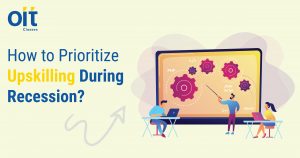
What is the Need for Upskilling During Recession?

Recessions are periods of economic downturn characterized by falling employment rates, shrinking GDP, and low productivity levels. The recent COVID-19 pandemic has caused a global economic recession, leading to massive job losses and economic instability. In such challenging times, upskilling has become a necessity for individuals and organizations to stay competitive and cope with the rapidly changing job market.
The Effects of a Recession on Employment
During a recession, companies tend to cut costs to stay afloat, leading to employee layoffs, reduced salaries, and hiring freezes. The job market becomes highly competitive, and finding employment becomes challenging, especially for individuals without specific skill sets. Moreover, automation and digitalization have accelerated during the pandemic, leading to job losses in traditional roles. Therefore, individuals who do not possess specialized skills or technology-driven competencies are likely to suffer the most during a recession.
The Importance of Upskilling
Here are some additional points to consider:
- Increased competitiveness: Upskilling provides individuals and organizations with a competitive edge, especially during tough economic times. By learning new skills or upgrading existing ones, individuals can position themselves as valuable assets to their employers, which, in turn, can lead to job security and promotions.
- Improved adaptability: The job market is constantly changing, and upskilling can help individuals adapt to new trends and demands. By staying up-to-date with industry changes and advances, individuals can remain relevant in their field.
- Enhanced career progression: Upskilling not only opens up new job opportunities, but it can also lead to promotions and leadership roles. By acquiring new knowledge and expertise, individuals can position themselves for career advancement.
- Increased earning potential: Upskilling can lead to higher salaries, better benefits, and more job opportunities. By demonstrating that they possess valuable skills and knowledge, individuals can negotiate for better pay and benefits.
- Job satisfaction: Learning new skills and taking on new challenges can be incredibly rewarding, leading to increased job satisfaction and a sense of personal accomplishment.
- Social and economic benefits: Upskilling not only benefits individuals and organizations but society as a whole. By filling skill gaps and taking up roles in emerging industries, individuals can contribute to the growth of the economy, reduce income inequality and poverty, and increase tax revenue.
- Improved innovation: Upskilling can lead to increased innovation as individuals learn new skills and bring fresh perspectives to their work. This can lead to more efficient processes, new products and services, and increased competitiveness.
- Continuous learning: Upskilling encourages a culture of continuous learning, where individuals are encouraged to keep learning and growing. This can lead to a more motivated workforce and a positive company culture.
Conclusion: To summarize, upskilling has numerous benefits for both individuals and organizations, including increased competitiveness, earning potential, job satisfaction, and a culture of continuous learning. Therefore, investing in upskilling is crucial for staying relevant in the ever-changing job market and contributing to the growth of the economy. By continuously upgrading skills, individuals can remain competitive and valuable assets to their organizations.





